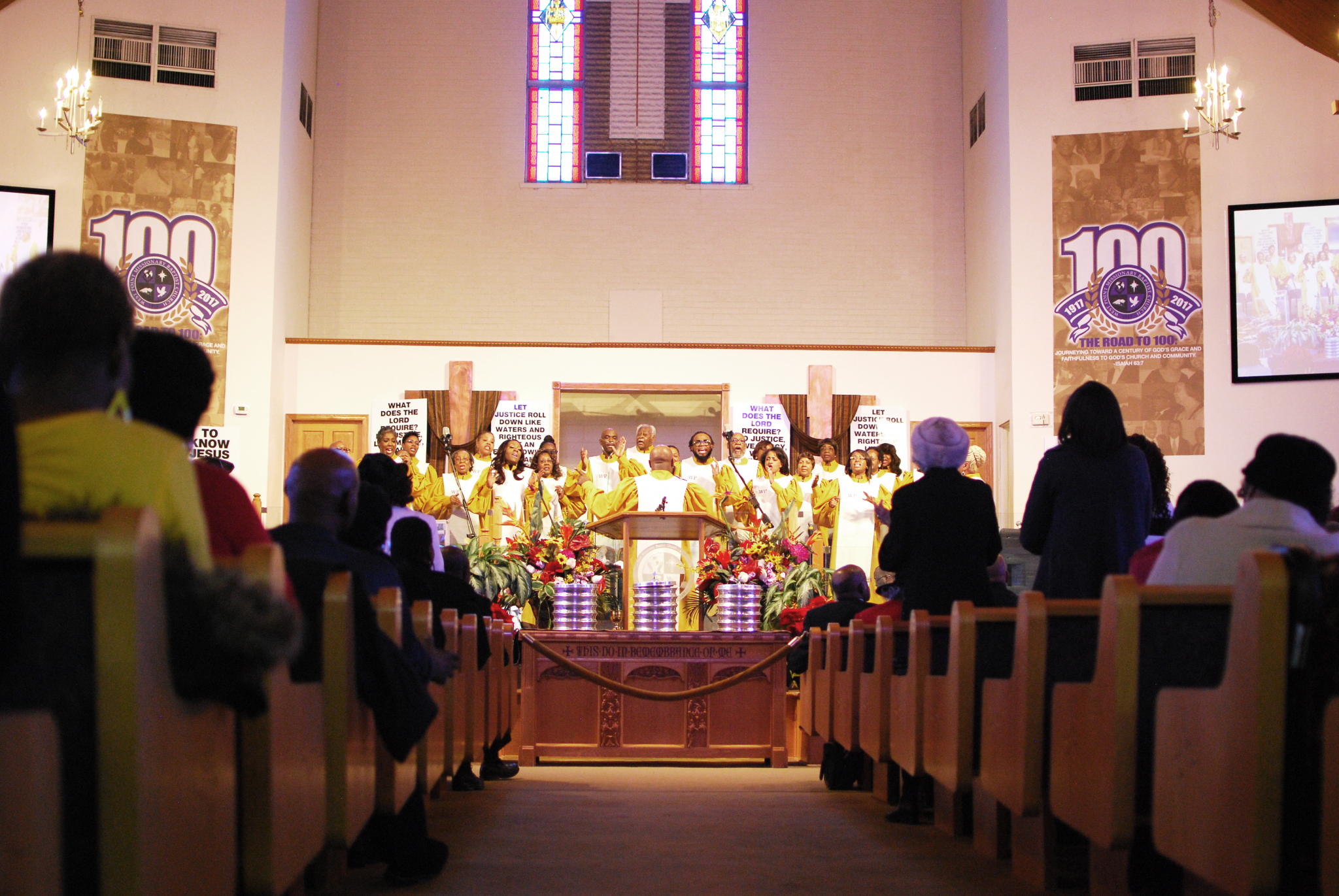West Point Baptist Church, the longtime home church of gospel legend Albertina Walker, sits squarely next to Ellis Park in Bronzeville. Just a block north at 35th Street, a commemorative street sign reads “Albertina Walker and the Caravans Drive,” marking this span of Cottage Grove a homage to the “Queen of Gospel” and The Caravans, the gospel group with which she grew to international acclaim.
It was here at West Point Baptist that Walker first began singing in the church choir at age four, and where she remained a member all her life, even as she catapulted to fame with The Caravans in the 1950s (she remained prominent in gospel music until her death in 2010). Even today, nearly five years after her death, Walker’s history with the church is still deeply felt; some of the members continue to affectionately refer to her simply as “Queen,” and many still recall the wisdom and experiences she shared there.
West Point Baptist’s senior pastor, Reverend Bernard Jakes, recalls, “She used to say to me, ‘People know my name all around the world, but here I’m just Albertina.’ ” Though Walker did just one record with the West Point choir, a 1981 release of “God Is Our Creator” with Savoy Records, West Point Baptist—as any congregant will tell you—was her home church.
Walker shared much more than music with West Point Baptist. She made it a point to cultivate relationships with church members old and young. Kemarius Lee, a younger congregant, told me, “Every year she would make it a point to see me before (I left for) college.” Marcus Johnson, a longtime congregant and friend of Walker’s, sat with her every week in the second-row pew. Johnson says that, despite her level of fame, “When she sang in the choir, she just wanted to be a part of the choir.”
Another congregant, Robert Nichols, who sits on the church’s board of trustees, first met Walker back in 1986 when he owned a restaurant in Baton Rouge. Walker had told Nichols that he should give her a call if he ever made it to Chicago, and when Nichols relocated in 2002, he did just that. He joined the congregation at West Point Baptist upon Walker’s insistence. When Walker developed health issues in the early 2000s and stopped singing regularly with the church, Nichols would sometimes accompany her to various concerts. “Even though she was on oxygen [at the time], when that spirit hit her, you’d often see her go and take that oxygen mask off,” he says.
Today, Walker’s legacy lives on in Chicago through the Albertina Walker Scholarship, which she helped found in 1988 to offer financial support to musical students—Johnson was on the original scholarship committee.
To bolster this legacy, Nichols and the church are hoping to have Ellis Park renamed after Walker. A proposal has been submitted, but nothing has yet to come of it. While the possible renaming of the park remains uncertain at this point, Walker’s musical influence persists—both within West Point and within gospel music at large.
“One of the things that she instilled in me was the importance of keeping the traditional sound of gospel music,” says Shantram Hawkins, the musical minister at West Point Baptist. Most modern churches have moved away from traditional gospel, which, as Hawkins explains, is generally comprised of three-chord harmonic progressions and in some way or another addresses the birth, death, and resurrection of Jesus Christ. This is not necessarily the case for plenty of today’s inspirational worship music. As musical director, Hawkins has tried to bridge the generational gap in church music, incorporating some contemporary praise songs into the service while still adhering to classic gospel songs for the bulk of the program. (Still, some of the older members at West Point Baptist recognize the trend toward a more contemporary rock style within the church’s music.)
Though he recognizes Walker’s insistence to maintain the music’s tradition, Hawkins still considers her to be a “fused gospel singer—a bit of traditional gospel with blues, and at times she would use jazz phrasing for certain songs.”
“Nobody else has that style,” says Howard Williams, another member of West Point’s congregation. Williams himself has been singing with the choir for nearly fifty years and he, more than some of the other congregants, emphasizes the generational aspect of Walker’s music. “Younger generations have not experienced really tough times like we experienced coming up. How do I put it? When you hear songs like she sings, we can really identify with it because we’ve experienced so much of it. And I guess that’s why we have such deep feelings about it,” he says.
Hawkins says that the most important conversation he ever had with Walker was when she told him not to completely abandon that traditional style: “She told me, ‘Don’t ever forget about the older generation.’ ”
Soon after Hawkins became West Point’s musical minister, Walker began singing less frequently with the choir due to her ailing health. He recalls that one of the last songs she ever sang with the choir was the traditional hymn “Great Is Thy Faithfulness.”
“When she would sing it would be so full,” he says. “It would be like Jeremiah said in the Bible—it’s like fire in the bones.”


To god be the glory for all she has done. I still today listen to her recording and oh how the recording take me to church.